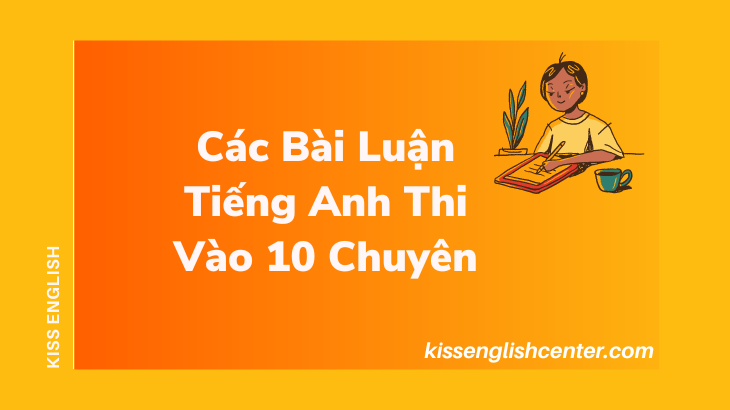Các Bài Luận Tiếng Anh Thi Vào 10 Chuyên
Trong bài viết này, KISS English sẽ chia sẻ cho các bạn các bài luận tiếng Anh thi vào 10 chuyên. Hãy theo dõi nhé.
Xem ngay cách nắm thuộc lòng 12 thì trong tiếng Anh tại đây:
Video hướng dẫn cách nắm thuộc lòng 12 thì trong tiếng Anh | Ms Thuỷ KISS English
Để ôn thi tiếng Anh vào lớp 10 chuyên, các bạn phải trau dồi thật kĩ 4 kĩ năng nghe, nói, đọc, viết. Trong đó, kĩ năng viết thường được xem là khó nhất. Vậy nên hôm nay, KISS English sẽ chia sẻ cho các bạn các bài luận tiếng anh thi vào 10 chuyên hay và chọn lọc.
Nội dung:
Bố Cục Các Bài Luận Tiếng Anh Thi Vào 10 Chuyên

Bố cục của một đoạn văn
- Câu mở đoạn (Topic sentence): gồm 1-2 câu sẽ nêu ý chính mà đoạn văn đề cập tới; thường là viết lại yêu cầu từ đề bài.
- Các câu thân đoạn (Supporting sentences): thường gồm 4-6 câu làm rõ từng khía cạnh cho ý chính được nhắc tới ở phần mở đoạn. Các câu này cần được liên kết với nhau bằng các liên từ sao cho thật rõ ràng, mạch lạc (VD: Firstly, Secondly, Finally…)
- Câu kết đoạn (Conclusion sentence): có thểm gồm 1-2 câu tổng kết, nhấn mạnh lại ý chính đã bàn tới ở trên.
Có 4 dạng đoạn văn chính là Descriptive (mô tả người, sự vật, nơi chốn), Narrative (kể chuyện), Expository (hướng dẫn từng bước để làm việc gì đó), Persuasive (thuyết phục, bảo vệ một luận điểm). Các bài luận tiếng Anh thi vào 10 chuyên thường tập trung vào dạng Persuasive.
Bài luận (essay)
Bài luận là một bài viết ngắn (gồm nhiều paragraph) về một đề tài cụ thể. Các bài luận tiếng Anh thi vào 10 chuyên thường có độ dài khoảng 250 từ.
Bố cục của bài luận:
- Mở bài (opening paragrah): gồm 2-3 câu giới thiệu chủ đề được bàn tới, sau đó thường là đưa ra câu trả lời cho câu hỏi trong đề bài. Câu hỏi này sẽ được phân tích, lý giải… cụ thể trong phần thân bài.
- Thân bài (body paragraph): thường gồm 2-3 đoạn
- Kết luận (conclusion paragraph): gồm 2-3 câu tóm tắt lại ý chính đã nêu ở phần trên.
Các Bài Luận Tiếng Anh Thi Vào 10 Chuyên

Mẫu 1: Poor students or students who come from rural areas often find it is difficult to get access to the university education, so some people think universities should make it easier for them to study at.
It is believed that students who come from a low-income family background or remote areas find some difficulties in continuing their undergraduate and graduate studies, therefore it is suggested that college and universities should provide special pathways for them. To a certain point, I would agree with the statement, but there should be additional requirements that these students must fulfil and the following essay will discuss it in details.
On the one hand, many students who come from a poor family or live in a rural area found some difficulties in entering universities. It is mostly due to the low quality of secondary education. The low-class students could only enroll to low-quality schools, while for those who live in remote areas, they are taught by junior teachers, who are still gaining some teaching experiences. As a result, they could not get the maximum quality education that they should get, and could not compete with other students when they participate in the registration test for entering universities. Therefore, it is suggested that post-secondary institutions should allocate some seats and provide some subsidies for them.
However, despite the special pathways, the institutions should provide some entry tests and academic background checks for these students. Universities must ensure that these students have some potential and eagerness to learn, and they have good academic scores in their secondary school studies, therefore the allocated seats and subsidised funds would not be a waste. This filter is a must since many of these students are entering universities but they are serious about learning and studying.
In conclusion, it is a fact that students from low economic backgrounds or live in rural areas find difficulties in entering post-secondary schools. Many people suggested that these institutions should give special pathways for them. I do agree with the statement, but some tests should be given to these students, therefore only those who are serious about studying will be enrolled.
Mẫu 2: Some universities now offer their courses on the Internet so that people can study online. Is this a positive or negative development? Give reasons for your answer and include any relevant examples from your own knowledge or experience.
It is true that online courses are becoming a common feature of university education. Although there are some drawbacks of Internet-based learning, I would argue that there are far more benefits.
The main drawback of the trend towards online university courses is that there is less direct interaction. Students may not have the opportunity to engage face-to-face with their teachers, and will instead have to rely on written forms of communication. Similarly, students who study online do not come into direct contact with each other, and this could have a negative impact on peer support, discussion and exchange of ideas. For example, whereas students on traditional courses can attend seminars and even discuss their subjects over coffee after lessons, online learners are restricted to chatting through website forum areas. These learners may also lack the motivation and element of competition that face-to-face group work brings.
Despite the negatives mentioned above, I believe that online university courses are a positive development for various reasons. Firstly, they allow learners to study in a flexible way, meaning that they can work whenever and wherever is convenient, and they can cover the material at their own pace. Secondly, the cost of a university education can be greatly reduced, while revenues for institutions may increase as more students can be taught. Finally, online learning offers open access to anybody who is willing to study, regardless of age, location, ability, and background. For example, my uncle, who is 65 years old, has recently enrolled on an online MBA course in a different country, which would have been impossible in the days before Internet-based education.
In conclusion, while I recognize the possible disadvantages of online learning, I consider it to be a positive development overall.
Mẫu 3: It has been said that people who read for pleasure have more developed imaginations and better language skills than people who prefer to watch TV. Do you agree or disagree?
Some people think that reading for pleasure increases people’s imagination and language skills more so than watching TV does. Personally, I totally agree with this view and will analyze the reasons in the following essay.
Reading for enjoyment can help people to develop their imagination and improve their language skills in many ways. Firstly, while watching television is said to be more of a passive activity, reading is considered to be an active form of learning. Reading stimulates people’s brains more as they have to use their imagination to visualize the characters and plot of the story, and this helps to further develop their imaginative thinking skills. Secondly, language skills can also be improved from reading. By reading regularly, people can expand their vocabulary and learn different grammatical structures and how to use them effectively.
Watching TV, on the other hand, does little to enhance people’s imagination and language skills. While reading, people have plenty of time to read the text and visualize the content of the story. However, when watching TV, viewers use their imagination very little, as they can see the images on the screen. Furthermore, the dialogue of the story or movie is usually spoken at a fast pace, which does not give viewers much time to comprehend what is being said, let alone learning anything new. Finally, television is full of advertisements these days and therefore distracts viewers from what they are watching. This makes it even more difficult for people to absorb information that might enhance their language skills.
In conclusion, I believe that reading books is a more efficient way for people to enhance their imagination and language skills, while watching TV is simply more of a source of entertainment.
Tham khảo thêm: http://kissenglishcenter.com/cac-bai-essay-tieng-anh-hay/
Lời Kết
Trên đây là những thông tin về các bài luận tiếng anh thi vào 10 chuyên mà KISS English muốn đem đến cho bạn. Hy vọng bài viết này phù hợp và bổ ích với bạn. Chúc bạn có một buổi học vui vẻ và hiệu quả.
Khám phá phương pháp học tiếng Anh thông minh 4.0 cùng KISS English:

